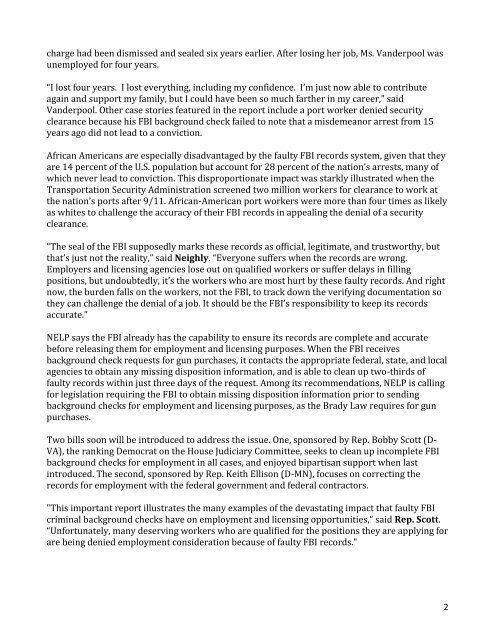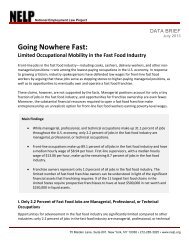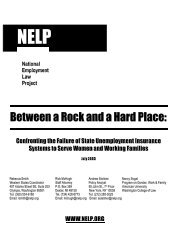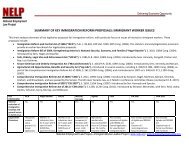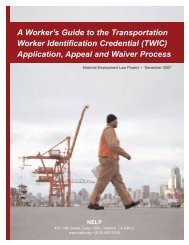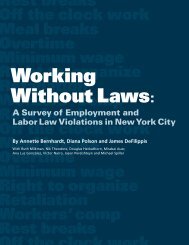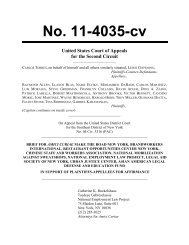National Employment Law Project
National Employment Law Project
National Employment Law Project
You also want an ePaper? Increase the reach of your titles
YUMPU automatically turns print PDFs into web optimized ePapers that Google loves.
charge had been dismissed and sealed six years earlier. After losing her job, Ms. Vanderpool was<br />
unemployed for four years.<br />
“I lost four years. I lost everything, including my confidence. I’m just now able to contribute<br />
again and support my family, but I could have been so much farther in my career,” said<br />
Vanderpool. Other case stories featured in the report include a port worker denied security<br />
clearance because his FBI background check failed to note that a misdemeanor arrest from 15<br />
years ago did not lead to a conviction.<br />
African Americans are especially disadvantaged by the faulty FBI records system, given that they<br />
are 14 percent of the U.S. population but account for 28 percent of the nation’s arrests, many of<br />
which never lead to conviction. This disproportionate impact was starkly illustrated when the<br />
Transportation Security Administration screened two million workers for clearance to work at<br />
the nation’s ports after 9/11. African-American port workers were more than four times as likely<br />
as whites to challenge the accuracy of their FBI records in appealing the denial of a security<br />
clearance.<br />
“The seal of the FBI supposedly marks these records as official, legitimate, and trustworthy, but<br />
that’s just not the reality,” said Neighly. “Everyone suffers when the records are wrong.<br />
Employers and licensing agencies lose out on qualified workers or suffer delays in filling<br />
positions, but undoubtedly, it’s the workers who are most hurt by these faulty records. And right<br />
now, the burden falls on the workers, not the FBI, to track down the verifying documentation so<br />
they can challenge the denial of a job. It should be the FBI’s responsibility to keep its records<br />
accurate.”<br />
NELP says the FBI already has the capability to ensure its records are complete and accurate<br />
before releasing them for employment and licensing purposes. When the FBI receives<br />
background check requests for gun purchases, it contacts the appropriate federal, state, and local<br />
agencies to obtain any missing disposition information, and is able to clean up two-thirds of<br />
faulty records within just three days of the request. Among its recommendations, NELP is calling<br />
for legislation requiring the FBI to obtain missing disposition information prior to sending<br />
background checks for employment and licensing purposes, as the Brady <strong>Law</strong> requires for gun<br />
purchases.<br />
Two bills soon will be introduced to address the issue. One, sponsored by Rep. Bobby Scott (D-<br />
VA), the ranking Democrat on the House Judiciary Committee, seeks to clean up incomplete FBI<br />
background checks for employment in all cases, and enjoyed bipartisan support when last<br />
introduced. The second, sponsored by Rep. Keith Ellison (D-MN), focuses on correcting the<br />
records for employment with the federal government and federal contractors.<br />
"This important report illustrates the many examples of the devastating impact that faulty FBI<br />
criminal background checks have on employment and licensing opportunities,” said Rep. Scott.<br />
“Unfortunately, many deserving workers who are qualified for the positions they are applying for<br />
are being denied employment consideration because of faulty FBI records."<br />
2


